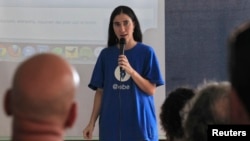HAVANA —
Cuba's best-known dissident, blogger Yoani Sanchez, said she plans to make good use of "my victory" when she leaves on an 80-day-tour of more than a dozen countries on Sunday.
Sanchez, under Cuba's sweeping migration reform that went into effect this year, was granted a passport two weeks ago, after being denied permission to travel more than 20 times over the past five years.
Sanchez, considered Cuba's pioneer in social networking, told Reuters on Thursday that she would visit the headquarters of Google, Twitter and Facebook, and travel to Brazil, Argentina, Peru, Mexico, the United States, Spain, Italy, Poland, the Czech Republic and other countries.
"This is a victory after fighting five years for my right to travel, using patience, energy, legal and journalistic tools, and most of all the solidarity of many people,'' she said, as she left her home to pick up a visa at a local embassy.
"I feel like a runner who has run the 110-meter hurdle. Tired, exhausted but happy to have met the challenge,'' she added.
Sanchez, a 37-year-old Havana resident, has incurred the wrath of Cuba's government for constantly criticizing its communist system in her "Generation Y" blog, and using Twitter to denounce repression.
Sanchez, one of the world's best known bloggers, has tens of thousands of followers abroad, but few in Cuba where the government severely restricts the Internet.
Her blog is named after the penchant of Cuban parents during the Cold War era of Soviet backing for the island to choose names for their children starting with "Y" because of the many popular Russian names starting with that letter.
Cuba's leaders consider dissidents traitorous mercenaries in the employ of the United States and other enemies. Official bloggers regularly charge that Sanchez's international renown has been stage-managed by western intelligence services.
Sanchez, who has won a number of international prizes for her blog but was denied permission to collect them, said she would now do so during her travels.
'Various Objectives'
"I have various objectives. I am going to give conferences at various universities, present my book [a collection of her blogs], receive the prizes I wasn't given permission to collect before and meet my readers, many of whom have followed me for six years,'' Sanchez said.
Sanchez' case is viewed as a test of the Cuban government's commitment to free travel under reforms that require only a passport, renewed every two years, to leave the country.
She is also likely to offer stern criticism of U.S. policy toward Cuba, including Washington's decades-old economic embargo against the island. In a recent blog, Sanchez said the embargo had failed to stifle the Cuban government and was exploited by Havana as ''a big bad wolf to blame for everything.''
Other leading dissidents have also received passports, though two less well-known government opponents, Angel Moya and Gisela Delgado, have been denied.
The old travel law was put in place in 1961 to slow the flight of Cubans after the island's 1959 revolution.
The new law scrapped the much-hated requirement to obtain an exit visa and loosened other restrictions that had discouraged Cubans from leaving.
It was one of the wide-ranging reforms President Raul Castro has enacted since he succeeded his older brother, Fidel Castro, in 2008.
There are still travel restrictions, mainly for national security reasons and for those with pending legal cases. That may affect a number of dissidents like Moya, who is on parole after being jailed in a 2003 crackdown on dissent.
"It's sweet-and-sour news. Yoani will travel to Mexico, Spain, Germany, and visit New York and Washington, D.C., and that's 'sweet' for Cubans everywhere. But, as with most things emanating from official Cuba, it's also 'sour,''' said Marifeli Perez-Stable, interim director at Florida International University's Latin American and Caribbean Center in Miami. "That she was given a passport and others have been denied underscores the arbitrariness of the migration reform.''
Sanchez said the travel changes fell short of "granting to anyone born on this island the inherent right to come and go,'' but nevertheless was a step forward that will have an "incalculable political and social impact,'' including for the government.
"In a way I am the flag-bearer of this new era that's beginning, where civil society is going to have access to international spaces and an international microphone and return with more information, knowledge and contacts,'' she said.
Sanchez, under Cuba's sweeping migration reform that went into effect this year, was granted a passport two weeks ago, after being denied permission to travel more than 20 times over the past five years.
Sanchez, considered Cuba's pioneer in social networking, told Reuters on Thursday that she would visit the headquarters of Google, Twitter and Facebook, and travel to Brazil, Argentina, Peru, Mexico, the United States, Spain, Italy, Poland, the Czech Republic and other countries.
"This is a victory after fighting five years for my right to travel, using patience, energy, legal and journalistic tools, and most of all the solidarity of many people,'' she said, as she left her home to pick up a visa at a local embassy.
"I feel like a runner who has run the 110-meter hurdle. Tired, exhausted but happy to have met the challenge,'' she added.
Sanchez, a 37-year-old Havana resident, has incurred the wrath of Cuba's government for constantly criticizing its communist system in her "Generation Y" blog, and using Twitter to denounce repression.
Sanchez, one of the world's best known bloggers, has tens of thousands of followers abroad, but few in Cuba where the government severely restricts the Internet.
Her blog is named after the penchant of Cuban parents during the Cold War era of Soviet backing for the island to choose names for their children starting with "Y" because of the many popular Russian names starting with that letter.
Cuba's leaders consider dissidents traitorous mercenaries in the employ of the United States and other enemies. Official bloggers regularly charge that Sanchez's international renown has been stage-managed by western intelligence services.
Sanchez, who has won a number of international prizes for her blog but was denied permission to collect them, said she would now do so during her travels.
'Various Objectives'
"I have various objectives. I am going to give conferences at various universities, present my book [a collection of her blogs], receive the prizes I wasn't given permission to collect before and meet my readers, many of whom have followed me for six years,'' Sanchez said.
Sanchez' case is viewed as a test of the Cuban government's commitment to free travel under reforms that require only a passport, renewed every two years, to leave the country.
She is also likely to offer stern criticism of U.S. policy toward Cuba, including Washington's decades-old economic embargo against the island. In a recent blog, Sanchez said the embargo had failed to stifle the Cuban government and was exploited by Havana as ''a big bad wolf to blame for everything.''
Other leading dissidents have also received passports, though two less well-known government opponents, Angel Moya and Gisela Delgado, have been denied.
The old travel law was put in place in 1961 to slow the flight of Cubans after the island's 1959 revolution.
The new law scrapped the much-hated requirement to obtain an exit visa and loosened other restrictions that had discouraged Cubans from leaving.
It was one of the wide-ranging reforms President Raul Castro has enacted since he succeeded his older brother, Fidel Castro, in 2008.
There are still travel restrictions, mainly for national security reasons and for those with pending legal cases. That may affect a number of dissidents like Moya, who is on parole after being jailed in a 2003 crackdown on dissent.
"It's sweet-and-sour news. Yoani will travel to Mexico, Spain, Germany, and visit New York and Washington, D.C., and that's 'sweet' for Cubans everywhere. But, as with most things emanating from official Cuba, it's also 'sour,''' said Marifeli Perez-Stable, interim director at Florida International University's Latin American and Caribbean Center in Miami. "That she was given a passport and others have been denied underscores the arbitrariness of the migration reform.''
Sanchez said the travel changes fell short of "granting to anyone born on this island the inherent right to come and go,'' but nevertheless was a step forward that will have an "incalculable political and social impact,'' including for the government.
"In a way I am the flag-bearer of this new era that's beginning, where civil society is going to have access to international spaces and an international microphone and return with more information, knowledge and contacts,'' she said.









